Business Ethics and Sustainability: Case Study Analysis and Report
VerifiedAdded on 2020/04/07
|9
|2195
|151
Report
AI Summary
This report delves into various ethical dilemmas encountered in the business world, analyzing case studies on topics such as child labor in toy manufacturing, loyalty and information sharing, social media use in hiring decisions, the integrity of organic food labeling, and responsible sourcing of Uzbek cotton. Each case study presents a complex situation requiring careful consideration of ethical principles, values, morals, and legal and policy implications. The report explores the challenges of balancing business objectives with ethical responsibilities, offering insights into decision-making processes and the potential consequences of different choices. The analysis considers various stakeholders, including employees, customers, and the broader community, to provide a comprehensive understanding of the ethical dimensions of business practices. The report concludes by emphasizing the importance of ethical considerations in all business decisions.
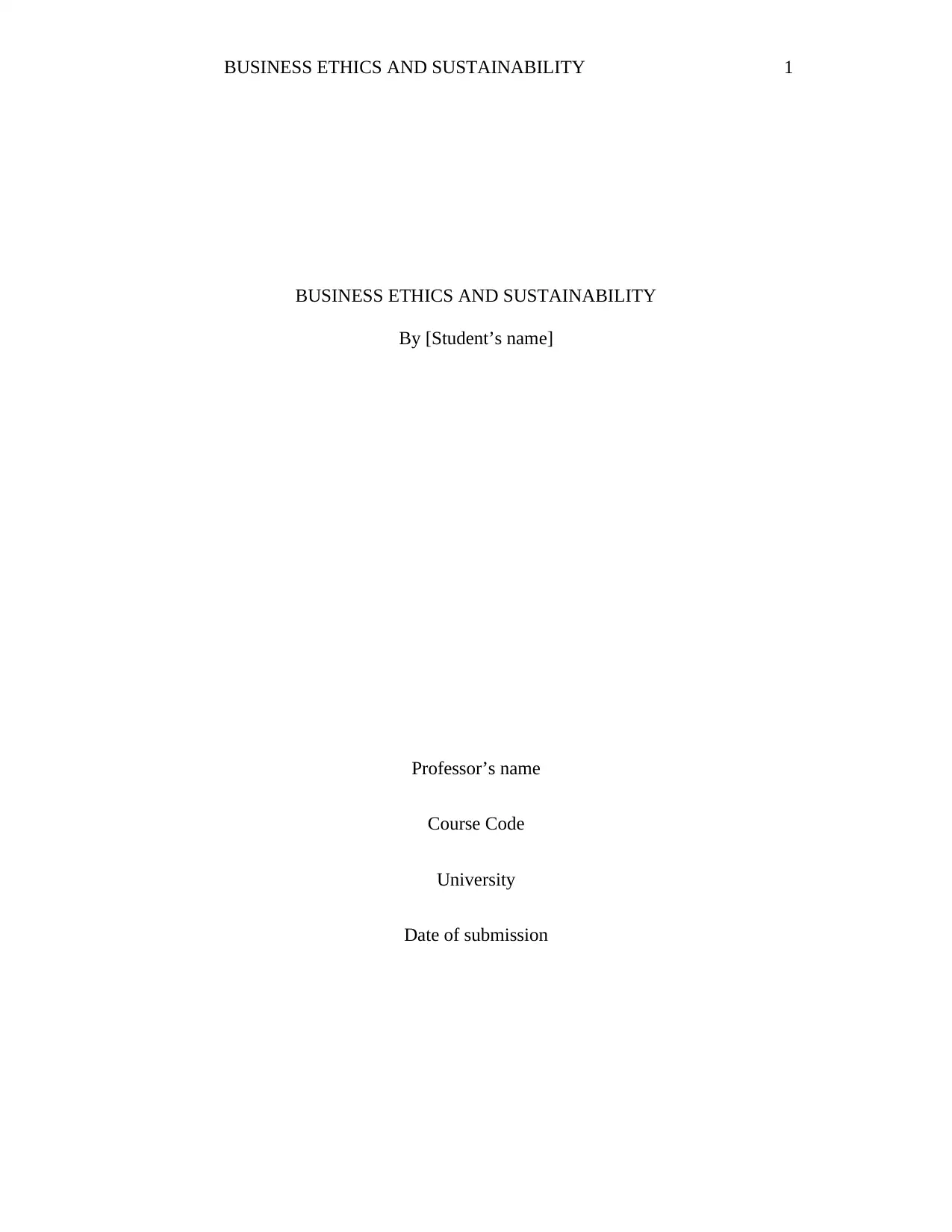
BUSINESS ETHICS AND SUSTAINABILITY 1
BUSINESS ETHICS AND SUSTAINABILITY
By [Student’s name]
Professor’s name
Course Code
University
Date of submission
BUSINESS ETHICS AND SUSTAINABILITY
By [Student’s name]
Professor’s name
Course Code
University
Date of submission
Paraphrase This Document
Need a fresh take? Get an instant paraphrase of this document with our AI Paraphraser
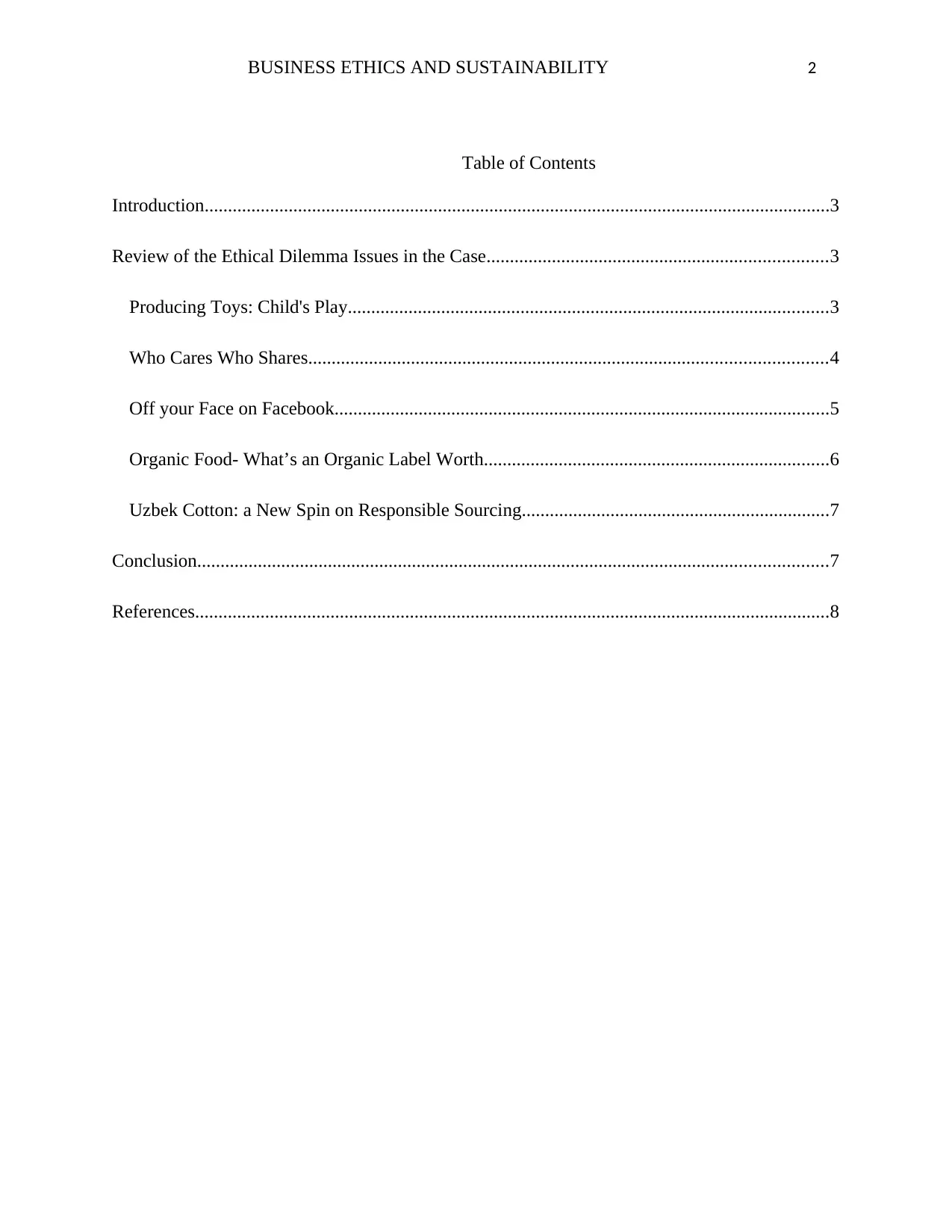
BUSINESS ETHICS AND SUSTAINABILITY 2
Table of Contents
Introduction......................................................................................................................................3
Review of the Ethical Dilemma Issues in the Case.........................................................................3
Producing Toys: Child's Play.......................................................................................................3
Who Cares Who Shares...............................................................................................................4
Off your Face on Facebook..........................................................................................................5
Organic Food- What’s an Organic Label Worth..........................................................................6
Uzbek Cotton: a New Spin on Responsible Sourcing..................................................................7
Conclusion.......................................................................................................................................7
References........................................................................................................................................8
Table of Contents
Introduction......................................................................................................................................3
Review of the Ethical Dilemma Issues in the Case.........................................................................3
Producing Toys: Child's Play.......................................................................................................3
Who Cares Who Shares...............................................................................................................4
Off your Face on Facebook..........................................................................................................5
Organic Food- What’s an Organic Label Worth..........................................................................6
Uzbek Cotton: a New Spin on Responsible Sourcing..................................................................7
Conclusion.......................................................................................................................................7
References........................................................................................................................................8
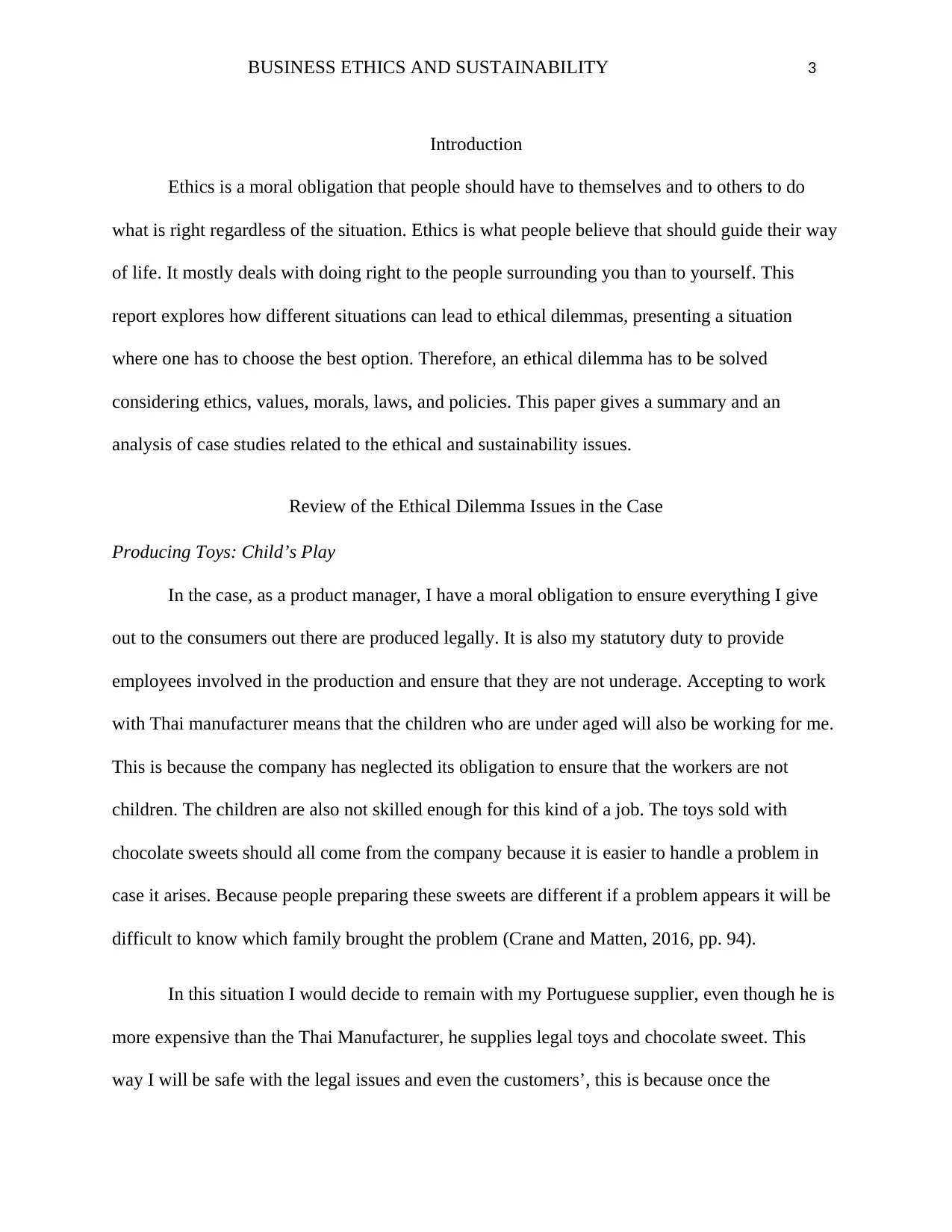
BUSINESS ETHICS AND SUSTAINABILITY 3
Introduction
Ethics is a moral obligation that people should have to themselves and to others to do
what is right regardless of the situation. Ethics is what people believe that should guide their way
of life. It mostly deals with doing right to the people surrounding you than to yourself. This
report explores how different situations can lead to ethical dilemmas, presenting a situation
where one has to choose the best option. Therefore, an ethical dilemma has to be solved
considering ethics, values, morals, laws, and policies. This paper gives a summary and an
analysis of case studies related to the ethical and sustainability issues.
Review of the Ethical Dilemma Issues in the Case
Producing Toys: Child’s Play
In the case, as a product manager, I have a moral obligation to ensure everything I give
out to the consumers out there are produced legally. It is also my statutory duty to provide
employees involved in the production and ensure that they are not underage. Accepting to work
with Thai manufacturer means that the children who are under aged will also be working for me.
This is because the company has neglected its obligation to ensure that the workers are not
children. The children are also not skilled enough for this kind of a job. The toys sold with
chocolate sweets should all come from the company because it is easier to handle a problem in
case it arises. Because people preparing these sweets are different if a problem appears it will be
difficult to know which family brought the problem (Crane and Matten, 2016, pp. 94).
In this situation I would decide to remain with my Portuguese supplier, even though he is
more expensive than the Thai Manufacturer, he supplies legal toys and chocolate sweet. This
way I will be safe with the legal issues and even the customers’, this is because once the
Introduction
Ethics is a moral obligation that people should have to themselves and to others to do
what is right regardless of the situation. Ethics is what people believe that should guide their way
of life. It mostly deals with doing right to the people surrounding you than to yourself. This
report explores how different situations can lead to ethical dilemmas, presenting a situation
where one has to choose the best option. Therefore, an ethical dilemma has to be solved
considering ethics, values, morals, laws, and policies. This paper gives a summary and an
analysis of case studies related to the ethical and sustainability issues.
Review of the Ethical Dilemma Issues in the Case
Producing Toys: Child’s Play
In the case, as a product manager, I have a moral obligation to ensure everything I give
out to the consumers out there are produced legally. It is also my statutory duty to provide
employees involved in the production and ensure that they are not underage. Accepting to work
with Thai manufacturer means that the children who are under aged will also be working for me.
This is because the company has neglected its obligation to ensure that the workers are not
children. The children are also not skilled enough for this kind of a job. The toys sold with
chocolate sweets should all come from the company because it is easier to handle a problem in
case it arises. Because people preparing these sweets are different if a problem appears it will be
difficult to know which family brought the problem (Crane and Matten, 2016, pp. 94).
In this situation I would decide to remain with my Portuguese supplier, even though he is
more expensive than the Thai Manufacturer, he supplies legal toys and chocolate sweet. This
way I will be safe with the legal issues and even the customers’, this is because once the
⊘ This is a preview!⊘
Do you want full access?
Subscribe today to unlock all pages.

Trusted by 1+ million students worldwide
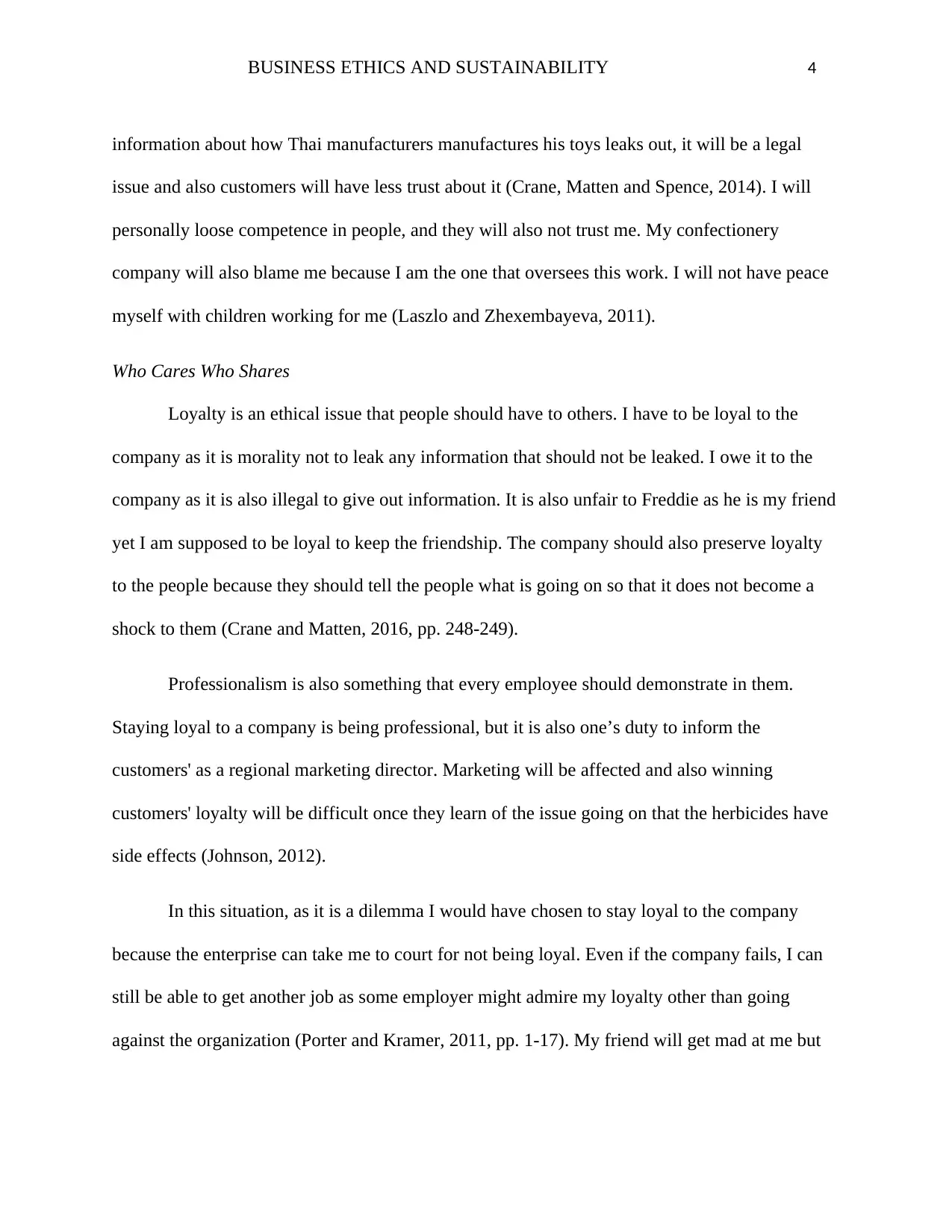
BUSINESS ETHICS AND SUSTAINABILITY 4
information about how Thai manufacturers manufactures his toys leaks out, it will be a legal
issue and also customers will have less trust about it (Crane, Matten and Spence, 2014). I will
personally loose competence in people, and they will also not trust me. My confectionery
company will also blame me because I am the one that oversees this work. I will not have peace
myself with children working for me (Laszlo and Zhexembayeva, 2011).
Who Cares Who Shares
Loyalty is an ethical issue that people should have to others. I have to be loyal to the
company as it is morality not to leak any information that should not be leaked. I owe it to the
company as it is also illegal to give out information. It is also unfair to Freddie as he is my friend
yet I am supposed to be loyal to keep the friendship. The company should also preserve loyalty
to the people because they should tell the people what is going on so that it does not become a
shock to them (Crane and Matten, 2016, pp. 248-249).
Professionalism is also something that every employee should demonstrate in them.
Staying loyal to a company is being professional, but it is also one’s duty to inform the
customers' as a regional marketing director. Marketing will be affected and also winning
customers' loyalty will be difficult once they learn of the issue going on that the herbicides have
side effects (Johnson, 2012).
In this situation, as it is a dilemma I would have chosen to stay loyal to the company
because the enterprise can take me to court for not being loyal. Even if the company fails, I can
still be able to get another job as some employer might admire my loyalty other than going
against the organization (Porter and Kramer, 2011, pp. 1-17). My friend will get mad at me but
information about how Thai manufacturers manufactures his toys leaks out, it will be a legal
issue and also customers will have less trust about it (Crane, Matten and Spence, 2014). I will
personally loose competence in people, and they will also not trust me. My confectionery
company will also blame me because I am the one that oversees this work. I will not have peace
myself with children working for me (Laszlo and Zhexembayeva, 2011).
Who Cares Who Shares
Loyalty is an ethical issue that people should have to others. I have to be loyal to the
company as it is morality not to leak any information that should not be leaked. I owe it to the
company as it is also illegal to give out information. It is also unfair to Freddie as he is my friend
yet I am supposed to be loyal to keep the friendship. The company should also preserve loyalty
to the people because they should tell the people what is going on so that it does not become a
shock to them (Crane and Matten, 2016, pp. 248-249).
Professionalism is also something that every employee should demonstrate in them.
Staying loyal to a company is being professional, but it is also one’s duty to inform the
customers' as a regional marketing director. Marketing will be affected and also winning
customers' loyalty will be difficult once they learn of the issue going on that the herbicides have
side effects (Johnson, 2012).
In this situation, as it is a dilemma I would have chosen to stay loyal to the company
because the enterprise can take me to court for not being loyal. Even if the company fails, I can
still be able to get another job as some employer might admire my loyalty other than going
against the organization (Porter and Kramer, 2011, pp. 1-17). My friend will get mad at me but
Paraphrase This Document
Need a fresh take? Get an instant paraphrase of this document with our AI Paraphraser
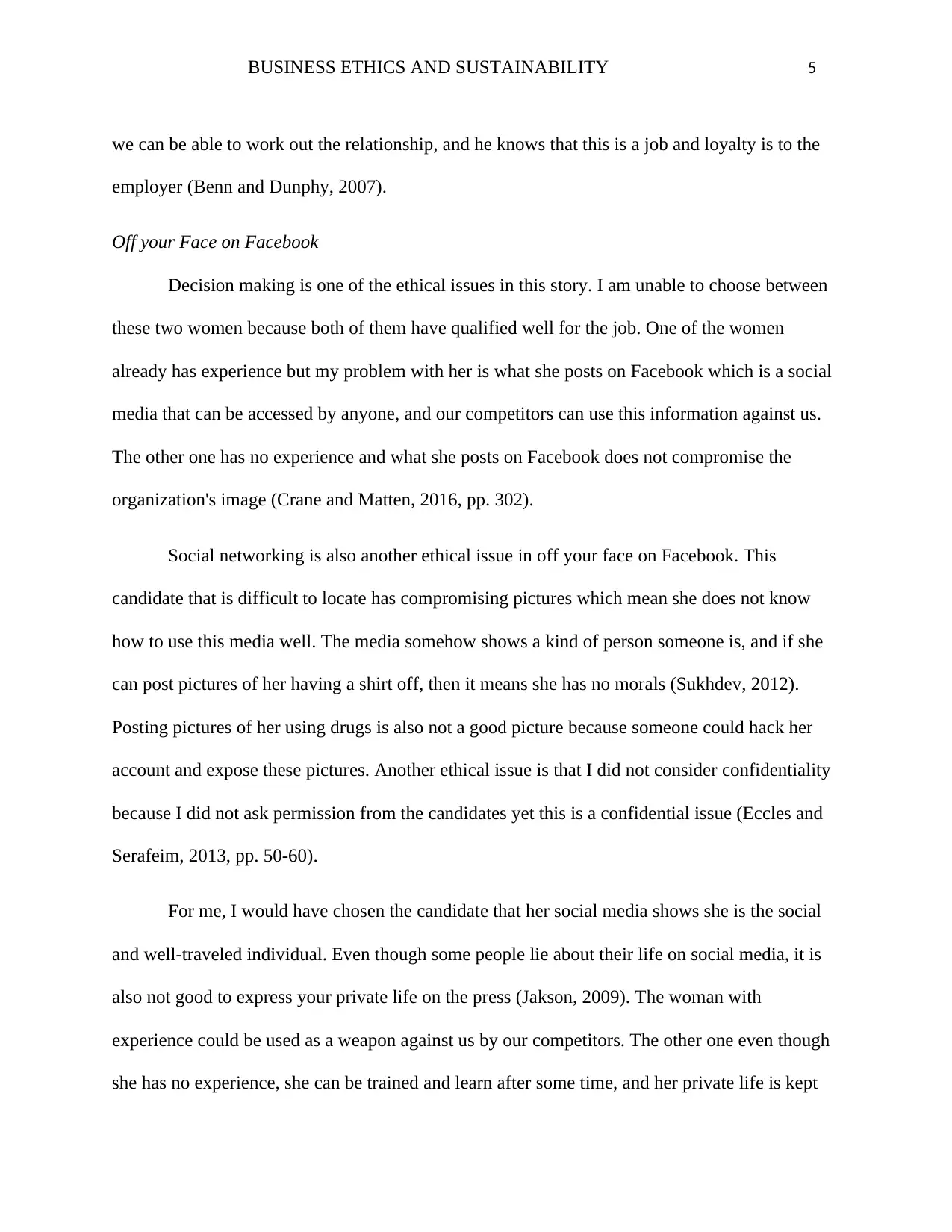
BUSINESS ETHICS AND SUSTAINABILITY 5
we can be able to work out the relationship, and he knows that this is a job and loyalty is to the
employer (Benn and Dunphy, 2007).
Off your Face on Facebook
Decision making is one of the ethical issues in this story. I am unable to choose between
these two women because both of them have qualified well for the job. One of the women
already has experience but my problem with her is what she posts on Facebook which is a social
media that can be accessed by anyone, and our competitors can use this information against us.
The other one has no experience and what she posts on Facebook does not compromise the
organization's image (Crane and Matten, 2016, pp. 302).
Social networking is also another ethical issue in off your face on Facebook. This
candidate that is difficult to locate has compromising pictures which mean she does not know
how to use this media well. The media somehow shows a kind of person someone is, and if she
can post pictures of her having a shirt off, then it means she has no morals (Sukhdev, 2012).
Posting pictures of her using drugs is also not a good picture because someone could hack her
account and expose these pictures. Another ethical issue is that I did not consider confidentiality
because I did not ask permission from the candidates yet this is a confidential issue (Eccles and
Serafeim, 2013, pp. 50-60).
For me, I would have chosen the candidate that her social media shows she is the social
and well-traveled individual. Even though some people lie about their life on social media, it is
also not good to express your private life on the press (Jakson, 2009). The woman with
experience could be used as a weapon against us by our competitors. The other one even though
she has no experience, she can be trained and learn after some time, and her private life is kept
we can be able to work out the relationship, and he knows that this is a job and loyalty is to the
employer (Benn and Dunphy, 2007).
Off your Face on Facebook
Decision making is one of the ethical issues in this story. I am unable to choose between
these two women because both of them have qualified well for the job. One of the women
already has experience but my problem with her is what she posts on Facebook which is a social
media that can be accessed by anyone, and our competitors can use this information against us.
The other one has no experience and what she posts on Facebook does not compromise the
organization's image (Crane and Matten, 2016, pp. 302).
Social networking is also another ethical issue in off your face on Facebook. This
candidate that is difficult to locate has compromising pictures which mean she does not know
how to use this media well. The media somehow shows a kind of person someone is, and if she
can post pictures of her having a shirt off, then it means she has no morals (Sukhdev, 2012).
Posting pictures of her using drugs is also not a good picture because someone could hack her
account and expose these pictures. Another ethical issue is that I did not consider confidentiality
because I did not ask permission from the candidates yet this is a confidential issue (Eccles and
Serafeim, 2013, pp. 50-60).
For me, I would have chosen the candidate that her social media shows she is the social
and well-traveled individual. Even though some people lie about their life on social media, it is
also not good to express your private life on the press (Jakson, 2009). The woman with
experience could be used as a weapon against us by our competitors. The other one even though
she has no experience, she can be trained and learn after some time, and her private life is kept
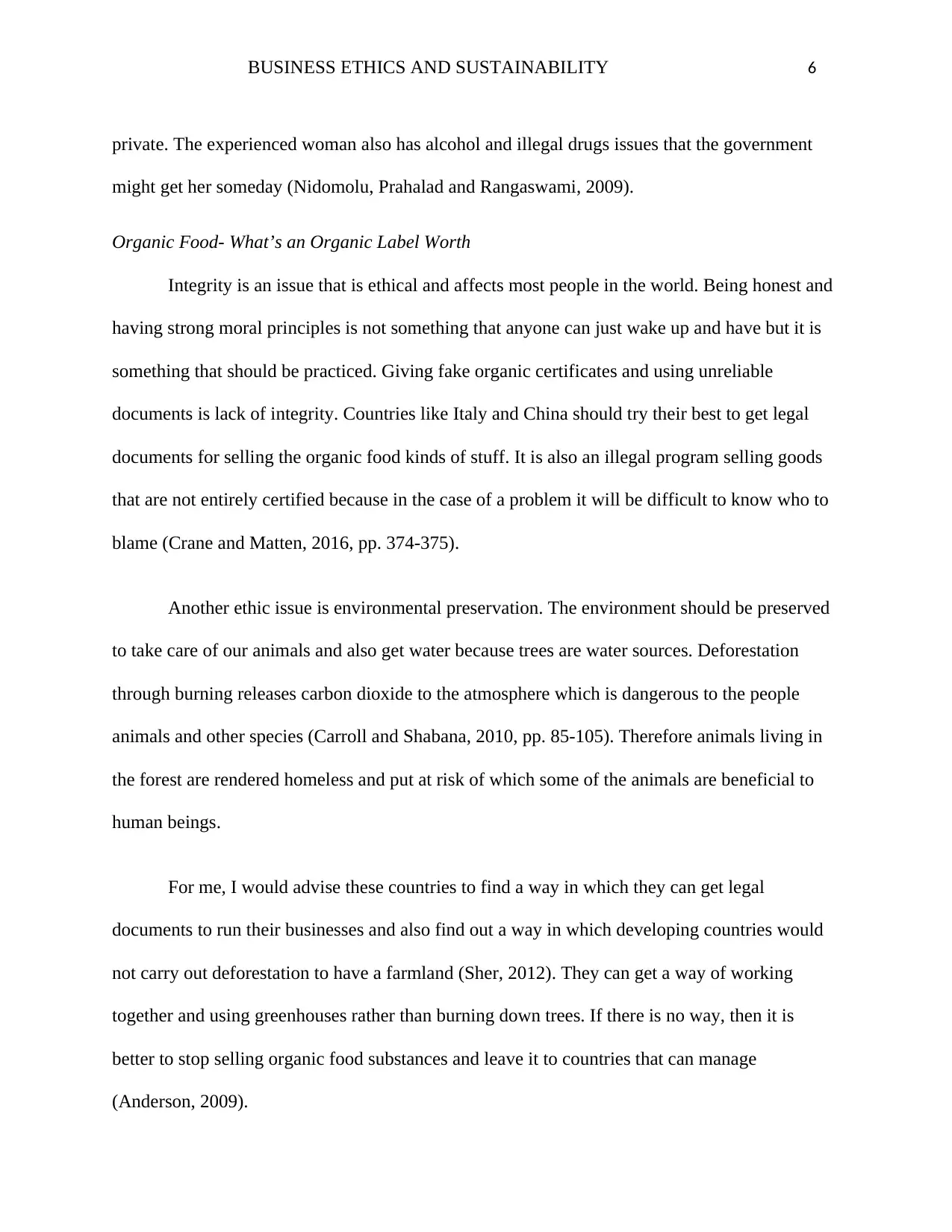
BUSINESS ETHICS AND SUSTAINABILITY 6
private. The experienced woman also has alcohol and illegal drugs issues that the government
might get her someday (Nidomolu, Prahalad and Rangaswami, 2009).
Organic Food- What’s an Organic Label Worth
Integrity is an issue that is ethical and affects most people in the world. Being honest and
having strong moral principles is not something that anyone can just wake up and have but it is
something that should be practiced. Giving fake organic certificates and using unreliable
documents is lack of integrity. Countries like Italy and China should try their best to get legal
documents for selling the organic food kinds of stuff. It is also an illegal program selling goods
that are not entirely certified because in the case of a problem it will be difficult to know who to
blame (Crane and Matten, 2016, pp. 374-375).
Another ethic issue is environmental preservation. The environment should be preserved
to take care of our animals and also get water because trees are water sources. Deforestation
through burning releases carbon dioxide to the atmosphere which is dangerous to the people
animals and other species (Carroll and Shabana, 2010, pp. 85-105). Therefore animals living in
the forest are rendered homeless and put at risk of which some of the animals are beneficial to
human beings.
For me, I would advise these countries to find a way in which they can get legal
documents to run their businesses and also find out a way in which developing countries would
not carry out deforestation to have a farmland (Sher, 2012). They can get a way of working
together and using greenhouses rather than burning down trees. If there is no way, then it is
better to stop selling organic food substances and leave it to countries that can manage
(Anderson, 2009).
private. The experienced woman also has alcohol and illegal drugs issues that the government
might get her someday (Nidomolu, Prahalad and Rangaswami, 2009).
Organic Food- What’s an Organic Label Worth
Integrity is an issue that is ethical and affects most people in the world. Being honest and
having strong moral principles is not something that anyone can just wake up and have but it is
something that should be practiced. Giving fake organic certificates and using unreliable
documents is lack of integrity. Countries like Italy and China should try their best to get legal
documents for selling the organic food kinds of stuff. It is also an illegal program selling goods
that are not entirely certified because in the case of a problem it will be difficult to know who to
blame (Crane and Matten, 2016, pp. 374-375).
Another ethic issue is environmental preservation. The environment should be preserved
to take care of our animals and also get water because trees are water sources. Deforestation
through burning releases carbon dioxide to the atmosphere which is dangerous to the people
animals and other species (Carroll and Shabana, 2010, pp. 85-105). Therefore animals living in
the forest are rendered homeless and put at risk of which some of the animals are beneficial to
human beings.
For me, I would advise these countries to find a way in which they can get legal
documents to run their businesses and also find out a way in which developing countries would
not carry out deforestation to have a farmland (Sher, 2012). They can get a way of working
together and using greenhouses rather than burning down trees. If there is no way, then it is
better to stop selling organic food substances and leave it to countries that can manage
(Anderson, 2009).
⊘ This is a preview!⊘
Do you want full access?
Subscribe today to unlock all pages.

Trusted by 1+ million students worldwide
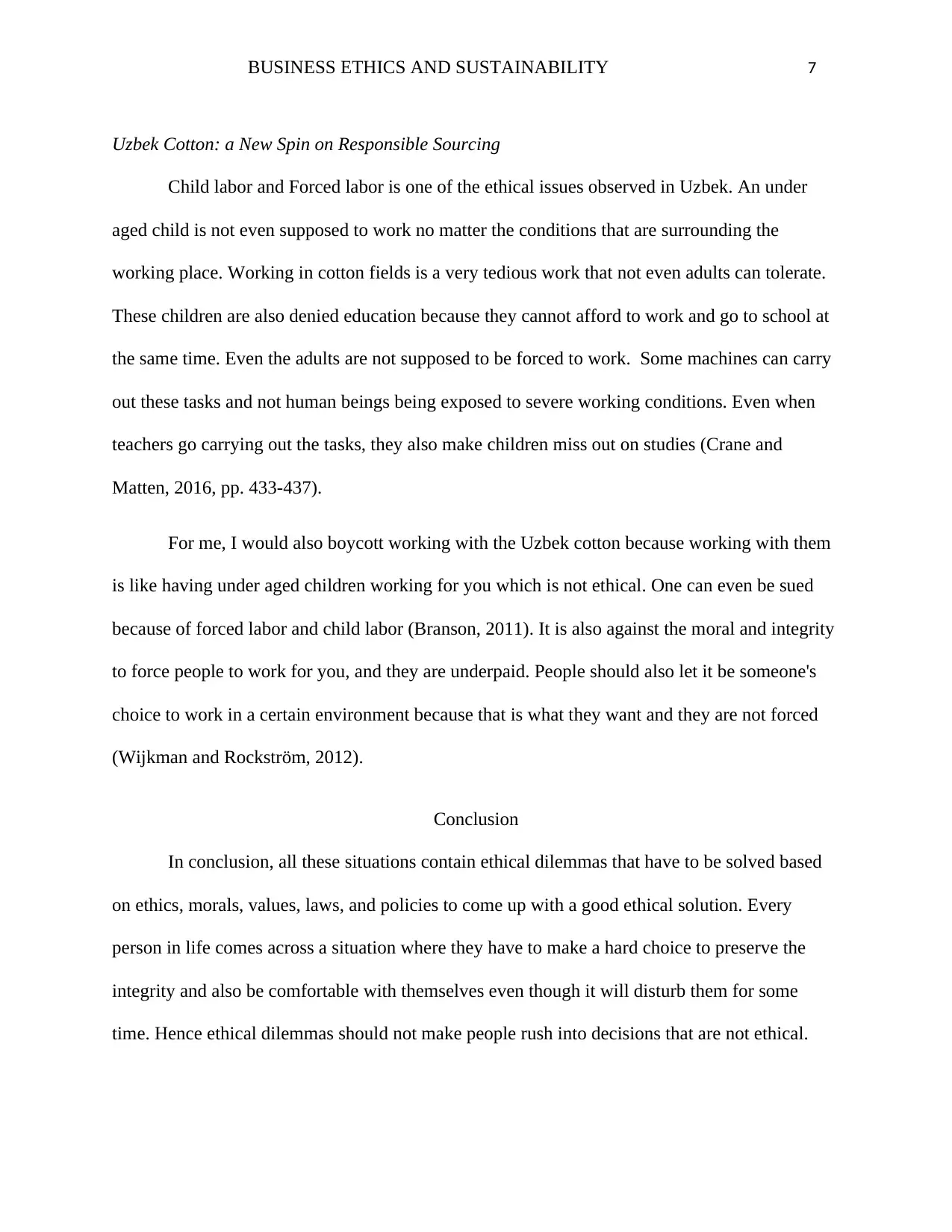
BUSINESS ETHICS AND SUSTAINABILITY 7
Uzbek Cotton: a New Spin on Responsible Sourcing
Child labor and Forced labor is one of the ethical issues observed in Uzbek. An under
aged child is not even supposed to work no matter the conditions that are surrounding the
working place. Working in cotton fields is a very tedious work that not even adults can tolerate.
These children are also denied education because they cannot afford to work and go to school at
the same time. Even the adults are not supposed to be forced to work. Some machines can carry
out these tasks and not human beings being exposed to severe working conditions. Even when
teachers go carrying out the tasks, they also make children miss out on studies (Crane and
Matten, 2016, pp. 433-437).
For me, I would also boycott working with the Uzbek cotton because working with them
is like having under aged children working for you which is not ethical. One can even be sued
because of forced labor and child labor (Branson, 2011). It is also against the moral and integrity
to force people to work for you, and they are underpaid. People should also let it be someone's
choice to work in a certain environment because that is what they want and they are not forced
(Wijkman and Rockström, 2012).
Conclusion
In conclusion, all these situations contain ethical dilemmas that have to be solved based
on ethics, morals, values, laws, and policies to come up with a good ethical solution. Every
person in life comes across a situation where they have to make a hard choice to preserve the
integrity and also be comfortable with themselves even though it will disturb them for some
time. Hence ethical dilemmas should not make people rush into decisions that are not ethical.
Uzbek Cotton: a New Spin on Responsible Sourcing
Child labor and Forced labor is one of the ethical issues observed in Uzbek. An under
aged child is not even supposed to work no matter the conditions that are surrounding the
working place. Working in cotton fields is a very tedious work that not even adults can tolerate.
These children are also denied education because they cannot afford to work and go to school at
the same time. Even the adults are not supposed to be forced to work. Some machines can carry
out these tasks and not human beings being exposed to severe working conditions. Even when
teachers go carrying out the tasks, they also make children miss out on studies (Crane and
Matten, 2016, pp. 433-437).
For me, I would also boycott working with the Uzbek cotton because working with them
is like having under aged children working for you which is not ethical. One can even be sued
because of forced labor and child labor (Branson, 2011). It is also against the moral and integrity
to force people to work for you, and they are underpaid. People should also let it be someone's
choice to work in a certain environment because that is what they want and they are not forced
(Wijkman and Rockström, 2012).
Conclusion
In conclusion, all these situations contain ethical dilemmas that have to be solved based
on ethics, morals, values, laws, and policies to come up with a good ethical solution. Every
person in life comes across a situation where they have to make a hard choice to preserve the
integrity and also be comfortable with themselves even though it will disturb them for some
time. Hence ethical dilemmas should not make people rush into decisions that are not ethical.
Paraphrase This Document
Need a fresh take? Get an instant paraphrase of this document with our AI Paraphraser
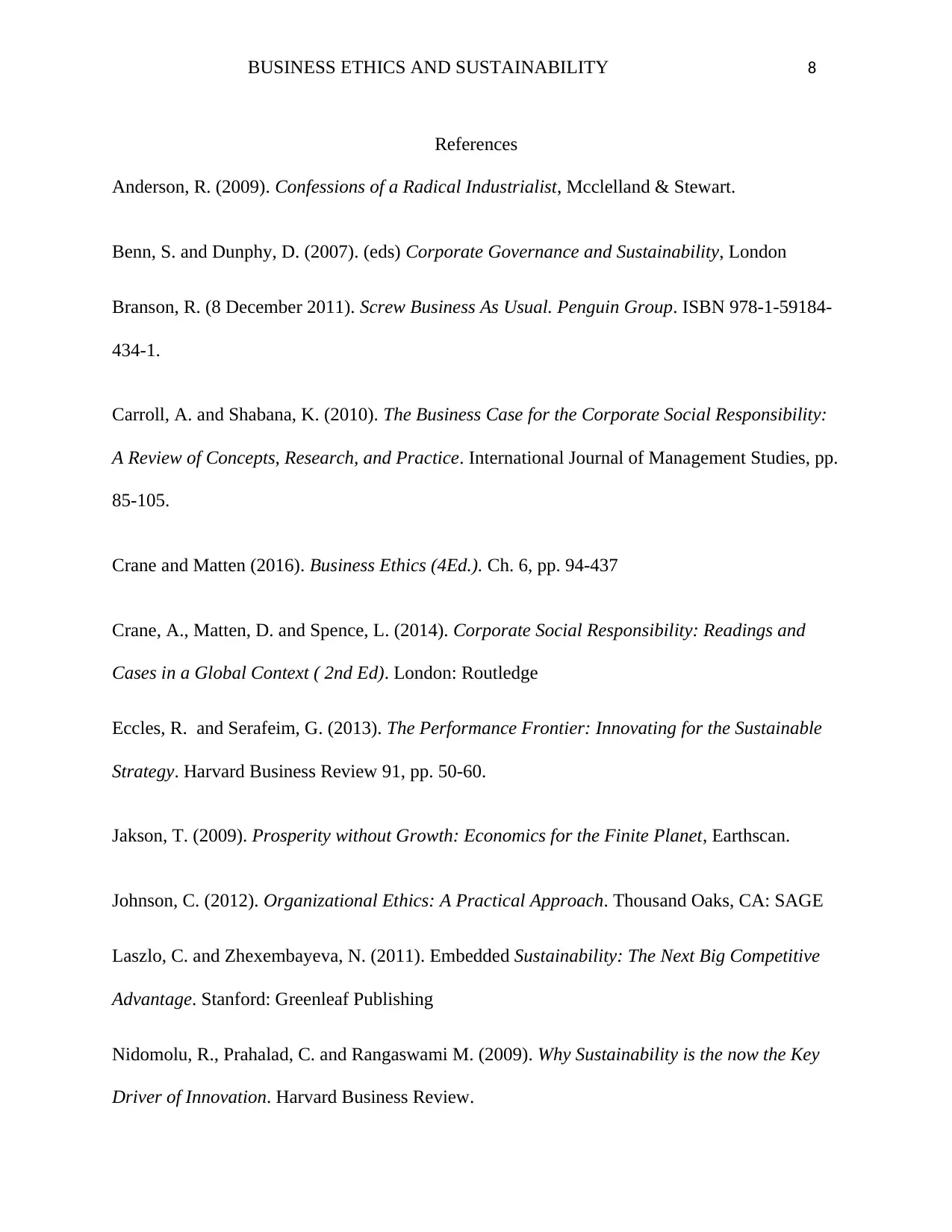
BUSINESS ETHICS AND SUSTAINABILITY 8
References
Anderson, R. (2009). Confessions of a Radical Industrialist, Mcclelland & Stewart.
Benn, S. and Dunphy, D. (2007). (eds) Corporate Governance and Sustainability, London
Branson, R. (8 December 2011). Screw Business As Usual. Penguin Group. ISBN 978-1-59184-
434-1.
Carroll, A. and Shabana, K. (2010). The Business Case for the Corporate Social Responsibility:
A Review of Concepts, Research, and Practice. International Journal of Management Studies, pp.
85-105.
Crane and Matten (2016). Business Ethics (4Ed.). Ch. 6, pp. 94-437
Crane, A., Matten, D. and Spence, L. (2014). Corporate Social Responsibility: Readings and
Cases in a Global Context ( 2nd Ed). London: Routledge
Eccles, R. and Serafeim, G. (2013). The Performance Frontier: Innovating for the Sustainable
Strategy. Harvard Business Review 91, pp. 50-60.
Jakson, T. (2009). Prosperity without Growth: Economics for the Finite Planet, Earthscan.
Johnson, C. (2012). Organizational Ethics: A Practical Approach. Thousand Oaks, CA: SAGE
Laszlo, C. and Zhexembayeva, N. (2011). Embedded Sustainability: The Next Big Competitive
Advantage. Stanford: Greenleaf Publishing
Nidomolu, R., Prahalad, C. and Rangaswami M. (2009). Why Sustainability is the now the Key
Driver of Innovation. Harvard Business Review.
References
Anderson, R. (2009). Confessions of a Radical Industrialist, Mcclelland & Stewart.
Benn, S. and Dunphy, D. (2007). (eds) Corporate Governance and Sustainability, London
Branson, R. (8 December 2011). Screw Business As Usual. Penguin Group. ISBN 978-1-59184-
434-1.
Carroll, A. and Shabana, K. (2010). The Business Case for the Corporate Social Responsibility:
A Review of Concepts, Research, and Practice. International Journal of Management Studies, pp.
85-105.
Crane and Matten (2016). Business Ethics (4Ed.). Ch. 6, pp. 94-437
Crane, A., Matten, D. and Spence, L. (2014). Corporate Social Responsibility: Readings and
Cases in a Global Context ( 2nd Ed). London: Routledge
Eccles, R. and Serafeim, G. (2013). The Performance Frontier: Innovating for the Sustainable
Strategy. Harvard Business Review 91, pp. 50-60.
Jakson, T. (2009). Prosperity without Growth: Economics for the Finite Planet, Earthscan.
Johnson, C. (2012). Organizational Ethics: A Practical Approach. Thousand Oaks, CA: SAGE
Laszlo, C. and Zhexembayeva, N. (2011). Embedded Sustainability: The Next Big Competitive
Advantage. Stanford: Greenleaf Publishing
Nidomolu, R., Prahalad, C. and Rangaswami M. (2009). Why Sustainability is the now the Key
Driver of Innovation. Harvard Business Review.
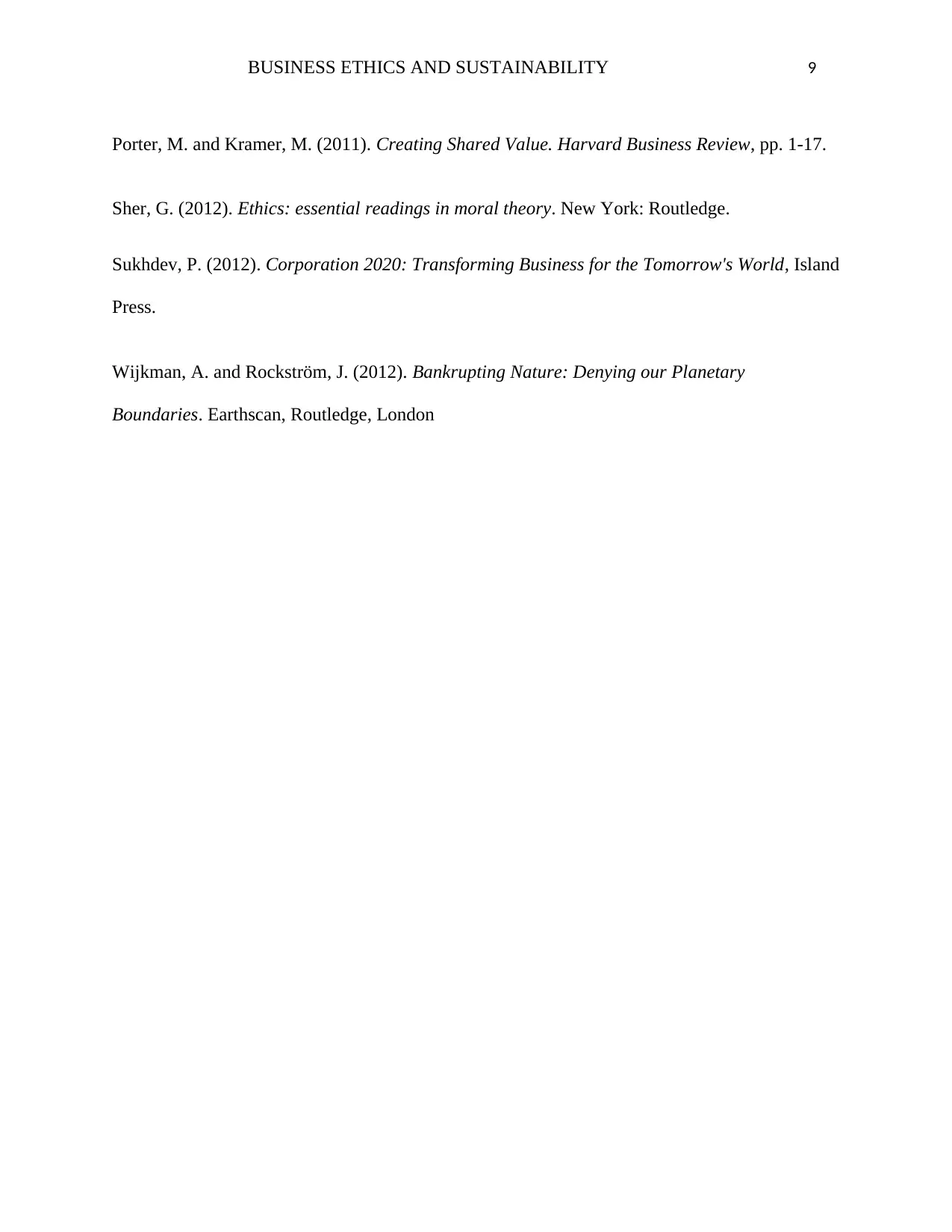
BUSINESS ETHICS AND SUSTAINABILITY 9
Porter, M. and Kramer, M. (2011). Creating Shared Value. Harvard Business Review, pp. 1-17.
Sher, G. (2012). Ethics: essential readings in moral theory. New York: Routledge.
Sukhdev, P. (2012). Corporation 2020: Transforming Business for the Tomorrow's World, Island
Press.
Wijkman, A. and Rockström, J. (2012). Bankrupting Nature: Denying our Planetary
Boundaries. Earthscan, Routledge, London
Porter, M. and Kramer, M. (2011). Creating Shared Value. Harvard Business Review, pp. 1-17.
Sher, G. (2012). Ethics: essential readings in moral theory. New York: Routledge.
Sukhdev, P. (2012). Corporation 2020: Transforming Business for the Tomorrow's World, Island
Press.
Wijkman, A. and Rockström, J. (2012). Bankrupting Nature: Denying our Planetary
Boundaries. Earthscan, Routledge, London
⊘ This is a preview!⊘
Do you want full access?
Subscribe today to unlock all pages.

Trusted by 1+ million students worldwide
1 out of 9
Related Documents
Your All-in-One AI-Powered Toolkit for Academic Success.
+13062052269
info@desklib.com
Available 24*7 on WhatsApp / Email
![[object Object]](/_next/static/media/star-bottom.7253800d.svg)
Unlock your academic potential
Copyright © 2020–2026 A2Z Services. All Rights Reserved. Developed and managed by ZUCOL.




